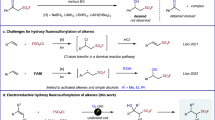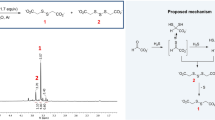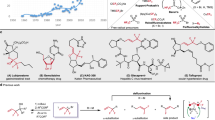Abstract
THE current theory on the mode of action of fluoroacetate1 implies the lethal synthesis of fluoro-citrate which poisons the enzyme aconitase, thus preventing the catabolism of citrate to aconitate; it seemed of interest to prepare and study α-fluoroaconitic acid, HOOC.CHF.C(COOH)=CH.COOH. Triethyl fluorocitrate, which would appear to be a suitable starting material, has been prepared in a facile reaction, namely, by the Reformatzky reaction between diethyl oxalofluoroacetate and ethyl bromoacetate2, but our attempts to dehydrate this compound failed to give a defined product.
This is a preview of subscription content, access via your institution
Access options
Subscribe to this journal
Receive 51 print issues and online access
$199.00 per year
only $3.90 per issue
Buy this article
- Purchase on Springer Link
- Instant access to full article PDF
Prices may be subject to local taxes which are calculated during checkout
Similar content being viewed by others
References
Peters, R. A., “Adv. in Enzymol.”, 18, 13 (Interscience Pub. Inc. New York, 1957).
Rivett, D. E. A., J. Chem. Soc., 3710 (1953).
Kacser, H., Discuss. Farad. Soc., 20, 289 (1955).
Blank, I., Mager, J., and Bergmann, E. D., Bull. Res. Council Israel, 3, 101 (1953); J. Chem. Soc., 2180 (1955).
Author information
Authors and Affiliations
Rights and permissions
About this article
Cite this article
BERGMANN, E., SHAHAK, I. Triethyl α-Fluoroaconitate. Nature 185, 529–530 (1960). https://doi.org/10.1038/185529b0
Issue Date:
DOI: https://doi.org/10.1038/185529b0
This article is cited by
-
Fluoroacetate and fluorocitrate: Mechanism of action
Neurochemical Research (1991)
Comments
By submitting a comment you agree to abide by our Terms and Community Guidelines. If you find something abusive or that does not comply with our terms or guidelines please flag it as inappropriate.



